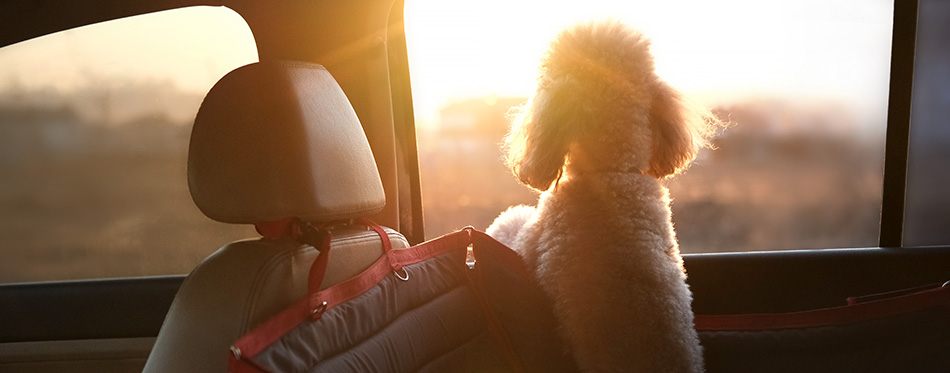It can be troubling for dog owners to see their pup make no effort to rush to their side when dishing out their meals. And even more so when they don’t even glance at the food when it’s set down for them. If this is the case, you may be wondering “How long can dogs go without food?” and “Why has my dog stopped eating?”. There can be a number of reasons for this that we will certainly cover here as well as helpful advice to assist pet owners in their pup’s recovery and food intake.

Loss Of Appetite – Symptoms
Those with multiple pets may not immediately see the symptoms of a sick dog, and may not be able to closely observe their eating habits, but there are ways of telling if your pooch isn’t eating without monitoring their food bowl. These indications could be any of the following or even a combination:
- Lethargy
- Vomiting
- Diarrhea
- Excessive dribbling
- Jaundice (yellowing of the eyes)
- Weight loss
- Struggling to eat or taking longer than normal
Why is My Dog Not Eating?
There are a number of reasons why your dog refuses to eat but don’t let this list daunt you. You know your pup better than anyone so you’re likely to find a root cause significantly easier which will allow you adequate time to get the best care and solution.
Health Problems
A medical issue can be the most common reason behind why a dog stops eating which is why we’ve placed this at the top of the list. Sometimes the pain is too much to handle so the urge to chow down their food is reduced or depleted altogether. Other times, the food irritates them further so they intentionally stay away.
Possible health conditions include:
- Digestive problems such as IBS, gastritis, or colitis
- Hypothyroidism
- Allergies
- Lung, heart, liver, or kidney disease
- Infections
- Cancer
- Parasites
In some instances, vomiting and diarrhea will occur before the loss of appetite so it’s important to note whether your pup has been showing any signs of these. A high temperature may also be a signal. Whatever the case, don’t panic, see your local vet as they will be able to provide further information and take the necessary precautions.
A condition isn’t always the reason however ruling out a health problem early can put owners at ease. To add, if a harmful issue is identified early, owners and vets can work as quickly as possible to combat the problem.
Dental Problems
Sore gums, abscesses, tartar build-up, broken, or chipped teeth can also cause dogs severe pain which can lead to them refusing food.
Emotional Distress
Unfortunately, dogs can be prone to stress and anxiety which are often brought along by trauma, change, and even loud noises or busy environments. For example, if you’ve recently moved home or had a party your dog can be experiencing stress due to major changes which can impact its appetite.
Fortunately, there a plenty of ways to make your dog feel at ease, including providing them with a quiet space, taking them for long walks, playing with them, or simply relaxing beside them and giving them some love. PetSide also has a useful article detailing the symptoms of emotional distress with great methods to ease and comfort them.
Medication
Nausea and an upset stomach can be common side effects of medication so this can often lead to a loss in appetite. If this is the case, it’s always worth contacting your vet’s office and letting them know as they may be able to provide advice or alternative medication.
Change In Diet
Changing your dog’s diet without introducing them to the new food gradually can mean that they will simply refuse food. Most dogs need time to adjust to the new food and will need to have increasing measurements added to their old food before the change can be made completely.
Spoiled Or Old Food
A dog’s sense of smell is significantly better than our own and can pick up on scents that may go unnoticed by humans. Bad food can also be discolored and have an additional ‘off’ odor to it which your dog may be more sensitive to. Spoiled food can also sometimes become contaminated by fungi or bacteria which can repel your dog. Always make sure your pup’s food is not old and is free from any molds and fungi.
Traveling
Like humans, dogs can sometimes experience travel sickness which can often switch off their appetite. If you’ve recently been on a long journey with your pooch at your side, and notice a lack of interest in their meals, traveling could be the cause.
In addition to this, the journey itself, and the change in environment may cause your pup to become anxious. This can also lead to a loss in your dog’s appetite.
Picky Eaters
In some cases, a dog’s refusal to eat may be because they no longer like that specific dog food or don’t like the height or material of the bowl itself.
Behavior
Refusal can also be down to the individual dog’s behavior. Many dogs that come from a shelter or rescue, with a few trust issues to tackle, maybe too uncomfortable to eat. This may lead you to have to form a better feeding schedule and choose quieter places for them to feel safe and relaxed enough to eat.
Aging
Older dogs are likely to lose their appetite as they age due to them becoming less active. Some adult dogs can develop joint or muscle issues as they get older such as arthritis which may take a toll on their mobility. When this happens they are not burning the energy that they used to and as a result, their appetite decreases.
Regularly Drinking Water But Not Eating
Without food, your dog will lack the proper nutrition it needs to live a healthy life. If your dog continues to drink water but is still refusing food, it is still important to consider the reasons above and seek the advice of a vet.
Also, a dog that continues drinking water but stops eating food can still become dehydrated. It can be especially dangerous if they begin to vomit or have diarrhea. If you notice your dog eating but not drinking, a helpful guide is available on PetSide to help owners understand dehydration and how long can a dog safely go without drinking water.

What Happens When Dogs Stop Eating Food
When a dog goes too long without food, long-term conditions and effects can start to set in and it can often be more difficult to treat. Unfortunately, dogs that suffer from existing health problems or are in their senior years can struggle more than healthy dogs who go without eating.
Hopefully, you’ll never have to know or witness what will happen to a dog if they go too long without eating. Sadly, a dog can suffer failure of the organs and eventually pass away.
How Long Can a Dog go Without Food?
A healthy dog can survive up to five days without eating although it should never be allowed to continue for such a time. However, it is common for a dog in good health to skip a meal so don’t panic if you notice that a meal hasn’t been touched. Just make sure they have access to fresh water and keep an eye on them to ensure they don’t miss too many or go more than a day without any nutrition.
Old, Sick, and Pregnant/Nursing Dogs
Old and/or sick dogs are a different matter and simply will not last as long as healthy dogs. So it’s crucial to seek immediate help. The same applies to pregnant and/or nursing dogs. Not only are these dogs at risk but their pups are too as they will not be able to provide the essential nutrients their pups need to grow and develop.
What To Do When Dogs Refuse Food
First, don’t panic. It’s important to keep a level head when your dog neglects their food as your second step will be carefully identifying the potential cause. Consider all of the factors above and if any of them apply to your dog’s life and current situation. By doing this you can then focus on what to do to tempt their appetite. Below is a list of options for you to implement
Take Advantage Of Or Limit Treats
A dog treat, piece of chicken, or a slice of cheese can tell owners a lot. If your pup wolfs the treat down without a second thought it could be that they are simply being picky and there’s no major cause for concern.
Although, if a medical condition is found to be the cause of the issue, you may want to hold off on giving them fatty or unhealthy treats that could exacerbate the problem.
Change Or Alter Their Diet
Changing or altering your dog’s food can help reignite their love of eating. If your dog is used to kibble, you could add a wet food topper or gradually swap it out for wet food altogether. You can also add warm water to their dry food as a way of keeping your dog hydrated as well as fed.
This can also go the other way, if your dog is used to canned food or other wet foods you can alternatively switch it to dry dog food instead.
If an upset tummy is the root cause of appetite reduction, replacing their usual dog food with a small amount of chicken and boiled rice will potentially encourage them to eat and it will be easier on their tummy. Bone or chicken broth is also a good way to provide them with nutrients and is found to be a favorite for sick dogs.
Change Their Surroundings/Schedule
If your dog is tense, anxious, or generally fussy a great method is to adjust feeding times and even where you feed them. Nervous dogs, and even sick pets, in general, may find quiet spots to eat in more relaxing especially if left alone and away from other pets. Separating your dog from other pets for a few hours may also reduce the chances of them becoming irritable or cautious around mealtimes allowing them to eat in peace.
By feeding dogs at particular times in secure places, you can encourage them to eat more, even if it’s a little bit at a time. Providing structure and safety will help them feel more relaxed and at home.
Pre-Meal Walks
Kickstart their appetite with a long walk or play session before meal times to burn energy and make room for a well-deserved snack or meal.
When To Seek Professional Veterinary Advice
Owners are encouraged to seek advice as soon as possible and never to wait a few days before making the call to their local vet clinic, especially if their pooch is vomiting or experiencing diarrhea. It could be that the tips above, after also being advised by your vet, may do the trick. However, there are alternative methods that can be used in extreme circumstances.
Veterinary Treatments
The longer your pup goes without eating the more at risk they are of becoming seriously ill. Unfortunately, even the most healthy dogs can become anorexic but there are ways to help. Your vet may provide you with some alternatives specifically prescribed to combat the worst-case scenario. This may include syringe-feeding, tube-feeding, or even appetite stimulants.
Syringe-feeding
This is where you will be prescribed a specific liquid diet to feed your dog via a syringe. The tool is used to simply push the substance directly into your dog’s mouth with relative ease. Although this method isn’t always ideal for those canines with behavioral issues or stubborn tendencies, this may suit other dogs with dental conditions better as they will not have to chew their meals.
Tube Feeding
This method is only applied in extreme cases and uses another specially formulated liquid rather than solid dog foods to supply dogs with the sustenance they need. The tube is inserted via the mouth and is fed directly to the stomach so that the liquid can reach it swiftly.
This useful guide by PetSide offers additional and in-depth information for dog owners who have a companion that has been diagnosed with or is suspected of having canine anorexia.
Insurance
No matter what your dog’s medical history entails, having insurance for your companion will make the world of difference if the worst should happen. Not only will you feel at ease when your dog gets the care they need but you will also be taken care of financially.

To Sum Up
Hopefully, you’ll never find yourself needing to know ‘how long can a dog live without food?’ or simply ‘how long can a dog go without eating?’. It can be a difficult situation to find yourself in but fortunately, our guides are always here to help but make sure to contact your vet if you’re uncertain or need further advice.

